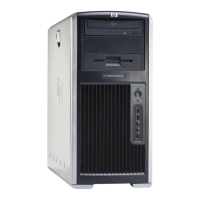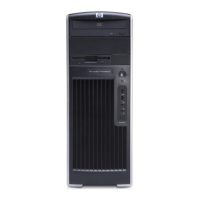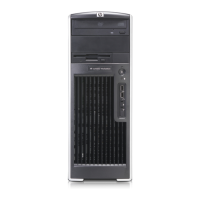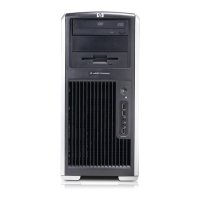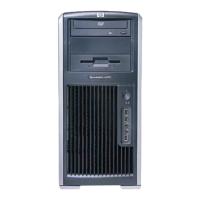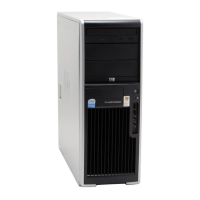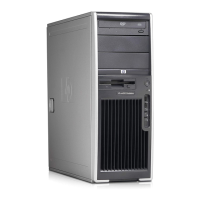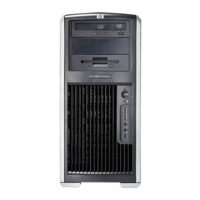3. Select your language from the list and press the Enter key. In the Computer Setup (F10) Utility
menu, five headings are displayed: File, Storage, Security, Power, and Advanced.
4. Use the arrow (left and right) keys to select the appropriate heading. Use the arrow (up and down)
keys to select the option you want, and press Enter.
5. To apply and save changes, select File>Save Changes then select Exit.
●
If you have made changes that you do not want applied, select Ignore Changes and Exit.
●
To reset to factory settings, select File>Default setup>Restore Factory Settings as
Default. Press F10 to accept the changes. Select Apply Defaults and Exit. This option
restores the original factory system defaults.
CAUTION: Do not power off the workstation while the ROM is saving your Computer Setup (F10)
Utility changes because the Complementary Metal-Oxide Semiconductor (CMOS) could become
corrupted. After you exit the F10 Setup screen, it is safe to disconnect power from the workstation.
Computer Setup (F10) Utility menu
NOTE: The following content is subject to change with new BIOS releases, so your menu might be
different than shown.
Table 3-1 Computer Setup (F10) Utility menu descriptions
Heading Option Description
File System
Information
Lists:
●
Product Name
●
SKU Number
●
Processor Type/Speed/Stepping
●
Cache Size (L1/L2)
●
Memory Type and Size
●
Integrated Media Access Control (MAC) for enabled or embedded NIC (if applicable)
●
System BIOS Type
●
Chassis Serial Number
●
Asset Tracking Number
●
Boot Block Date
About Displays copyright information.
Set Time and
Date
Enables you to set system time and date.
Flash System
ROM
Enables you to flash (update) system BIOS using any supported removable mass storage device
(CD-ROM, USB drive, floppy).
Replicated
Setup
Save to Removable Media
Saves the system configuration, including CMOS, in the CP”QSETUP.TXT file. This file can be
saved to a formatted, blank 1.44-MB diskette or to a USB device.
Restore from Removable Media
Restores previous F10 Setup configuration from a text file called CPQSETUP.TXT, which can be
used for Replicated Setup functions.
ENWW Computer Setup (F10) Utility 27

